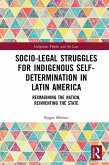This book offers an original account of how contemporary intellectual property rights regimes could be adapted to suit traditional knowledge. It examines the ways in which international developments to protect collectively held knowledge typically associated with Indigenous Peoples could de developed to protect cultural signifiers which lies outside the scope of intellectual property protection. The book considers case studies such as the steel pan of Trinidad and Tobago, punta rock music from Belize, Brazilian capoeira, and the cajón, a musical instrument, of Peru, and sets out how rights proposed for these cultural signifiers might be implemented both internationally and domestically.
Dieser Download kann aus rechtlichen Gründen nur mit Rechnungsadresse in A, B, BG, CY, CZ, D, DK, EW, E, FIN, F, GR, HR, H, IRL, I, LT, L, LR, M, NL, PL, P, R, S, SLO, SK ausgeliefert werden.









